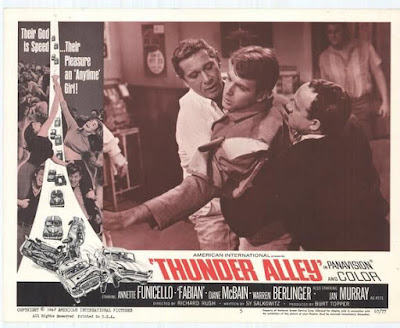Annette received top billing for the first and only time with this movie. It was also the end of her career as a star actress. She had been in show business since the age of twelve, first under contract to Walt Disney and then to AIP. For a while she was working for both studios at the same time. Now twenty-four, married, and the mother of a little girl, Annette was more dedicated to her family life than life as a movie star. THUNDER ALLEY fulfilled the requirements of her AIP contract. What's fascinating about that particular development is that this film gives her the chance to do some serious acting and she does a surprisingly good job. In fact, she gives the best performance of her career, perhaps even better than her likable comedic turn in BEACH PARTY (1963). Of course, it must be said that the concept of "serious acting" had a different meaning in an AIP racetrack epic than it did for more mainstream Hollywood movies. Still, Annette shows considerable promise as an adult actress, and her fans can only wonder what her career may have been like if she had chosen to continue making films.
She is joined by a good cast of actors. Fabian, now retired from his brief career as a pop singer, had a natural, masculine, easy-going acting style. Beautiful Diane McBain had a sexy kind of sophistication all her own. And Warren Berlinger, another young actor associated with teenage roles like BLUE DENIM (1959) and BECAUSE THEY'RE YOUNG (1960) was also very intense and energetic. The cast is rounded out with comedian and sometime actor Jan Murray, who had been quite impressive in the cult classic WHO KILLED TEDDY BEAR?
(1965).
Fabian plays racer Tommy Callahan, who is troubled by blackouts during races. One such incident causes the death of another driver, and Tommy's career is seemingly over. He takes a job with Pete Madsen's (Murray) stunt driving show and gets to know Madsen's daughter, Francie (Funicello) and her boyfriend, Eddie (Berlinger), both of whom are drivers in the show. Tommy has brought along his latest girlfriend, Annie (McBain), a "track tramp" he has picked up along the circuit. As Tommy and Francie began to be interested in each other, he is given a chance to resume racing. He tries to find out what is causing his blackouts, finally realizing they are associated with something that happened when he was a child. Meanwhile, there are romantic conflicts, a few fights, and more racing footage than most people could possibly ever want.
That's about it, story wise. There's nothing terribly profound going on in this unpretentious B-flick, but for the most part, the movie is well-made. The director, Richard Rush, also made THE SAVAGE SEVEN (1968) and the excellent PSYCH-OUT (1968) for AIP. If there are any drawbacks, they have to do with the script. As good as Annette is, she is letdown by some of the dialogue she has to deliver. When her father asks Francie if she wants Tommy for herself, her response is: "I want him so bad, I ache." It's difficult to imagine even Bette Davis being able to get by with a ridiculous line like that. There is another scene where Francie has gotten herself drunk and is driving recklessly around the track until stopped by Tommy. The scene doesn't come off well, and it's a little uncomfortable for those of us who love Annette to see her doing something so embarrassing. She fares much better in a confrontation with McBain where the two women are discussing their mutual interest in Mr. Callahan. McBain is much more suited for this kind of thing, having played bad girls in films like PARRISH (1961), but Annette makes a formidable adversary. The movie also features some very lame "comedy" relief from bit players like Maureen Arthur, cast as a supposedly sexy track tramp. Most of these moments could have been cut from the movie with no sense of loss.
One only has to look at the posters and lobby cards for THUNDER ALLEY to see what AIP was trying to promote with the film. "Days of Screaming Wheels...Nights of Reckless Pleasure." "Their God is Speed...Their Pleasure an 'Anytime' Girl." Not exactly the kind of details usually associated with an ex-Mouseketeer. Nothing explicit is shown during the film's 89-minute running time, but there are some things that tend to push the envelope beyond Beach flick standards. Tommy and Annie are obviously involved in an intimate relationship. And there is an extended wild party scene where things get, well, pretty wild. And there is a scene where Eddie, jealous of Francie's obvious attraction to Tommy, gets rough with her when dropping her off from a date and refers to her as a track tramp. Who knows? Maybe doing scenes like this played a part in Annette's decision to drop out of acting. She does get to sing one song when the party scene is just beginning. It's called "When You Get What You Want" and was composed by Guy Hemric and Jerry Styner. It was without a doubt the best singing performance she gave since her pop princess days with Disney. It's a lovely moment for her, fashionably dressed and interacting with the musicians. A fitting swan song. It's interesting to note that Annette virtually disappears from the party scene as it goes from wild to crazy and beyond. Seeing her in such an atmosphere would have been as uncomfortable and inappropriate as her attempted drunk driving scene.
Despite a few negative points, THUNDER ALLEY is another fun watch from the good folks at American-International. And the incessantly played title song, also composed by Hemric and Styner, will remain in your head for quite a while after the movie ends. Be forewarned!


.jpg)




Have to admit I'd be more attracted to Diane McBain than Annette (ha!)
ReplyDeleteIt's all subjective, my friend!!
Delete